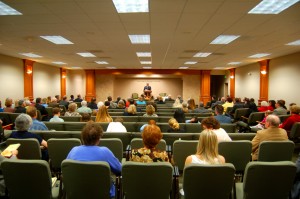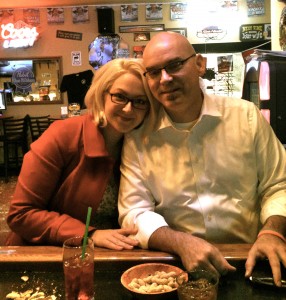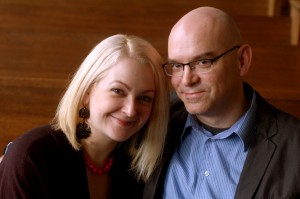Each week, Amanda and I visit a different church, sitting quietly, taking notes and—if granted permission to do so—discreetly taking a few pictures. As journalists, we tend not to participate in their rituals, maintaining an (ahem) “objective” distance from the service. We’re just flies on the wall. Okay, cynical, atheistic flies who know where all the best Happy Hours are. But still.
This last Sunday, we did things a little differently. We attended the annual Memorial of Christ’s Death at a “Kingdom Hall” of my religious alma mater—Jehovah’s Witnesses—where I quietly partook of the emblems representing Jesus’ flesh and blood.
I wasn’t the only ex-Witness to attend the Memorial and munch their bread and wine. I personally know several others around the country did the same thing, no doubt to the shock of onlookers in those Kingdom Halls. In my case, it prompted one of the church elders to expel me from the premises.
His reaction was understandable. As Amanda said in her post covering the event, I’d just pissed in their cornflakes.* Was I out of line? Yes and no. I believe that what I did was not only justifiable, but a necessary act of peaceful protest against their tradition of religious abuse.
Worldwide, there are about eight million Jehovah’s Witnesses. It is estimated that about 60,000 of them are “disfellowshipped”—shunned by their community—each year. Such “judicial action” is handed down by secretive tribunals made up of local elders for a variety of behaviors ranging from adultery to gambling to smoking. Once the announcement regarding this decision is made, friends and family are expected to cut off all association with the individual.
The Jehovah’s Witness monthly Our Kingdom Ministry, dated August, 2002, instructs Witnesses to “avoid social fellowship with an expelled person.” By way of explanation, it adds, “This would rule out joining him in a picnic, party, or trip to the shops or theatre or sitting down to a meal with him either in the home or at a restaurant…. A simple ‘Hello’ to someone can be the first step that develops into a conversation and maybe even a friendship. Would we want to take that first step with a disfellowshipped person?”
Those who voice their disagreement with the elders’ decision in this matter can themselves be subject to disfellowshipping; as a result, compliance is rarely a problem.
Though they go to public schools and work normal jobs, Jehovah’s Witnesses live otherwise isolated lives. They are urged to cultivate relationships within the religion, withdrawing from friends and family who do not share their faith. Drawing a distinction between church members and those “in the world,” The Watchtower says:
“[W]e are wise to cultivate close friendships only with those who love Jehovah. Completely avoiding contact with those in the world is neither possible nor required. … [Yet,] it is one thing to have necessary limited contact with the world and quite another to cultivate close ties with it. Thus, we are able to make mature decisions as to whether we will participate in extracurricular activities at school, such as sports events and dances, and attend parties and dinners arranged for fellow employees.”—March 15, 2006, p.23.
The implication is that a “mature decision” entails abstaining from social activities. As a point of fact, virtually all Jehovah’s Witnesses follow that direction.
Such expectations are fine for those who flourish in the religion. But what if someone doesn’t? What if someone, you know, acts like a human, “sins,” and is deemed by a committee of elders, behind closed doors, that the person is unrepentant? If disfellowshipped, that person can find him- or herself stripped of every close tie they ever had.
As you can imagine, this can be devastating—emotionally, psychologically and mentally. Tragically, those shunned are often still in their teen years. It’s not unusual for such a young person to be kicked out of the home once he or she has been deemed “bad association.” Some are plunged into depression, while others attempt suicide. A few succeed.
I have to confess that I participated in this religious abuse myself for many years.
And then I found myself on the outside of the Jehovah’s Witnesses. For the first time in my life, I started talking to disfellowshipped Witnesses, listening to their narratives. I heard story after heartbreaking story about individuals who had been horribly mistreated by their own “brothers,” like the 18-year-old girl who, alone and desperate, came down with pneumonia, but whose parents refused to take her to the hospital.
Like the father whose Witness ex-wife spread rumors that he had sexually molested their children. (Actually, such slander rather common. According to the rumors about me, I was disfellowshipped for carrying on adulterous affairs. In hindsight, I wish that had been true.)
Like the 16-year-old girl who, having come out as a lesbian, was thrown out of her house—after her mother first raided her bank account—and spent six months homeless and penniless, until an ex-Witness family took her into their home.
And then there was Cady, who simply realized the religion wasn’t for her and decided to cease identifying herself as a Witness. With that, after little more than a tearful phone call, her family cut her off. She says, “It would be easier to hate the Witnesses if they were all a group of thugs, not the people you’d loved and shared decades of life with. But the pain is meted out directly from the people you love the most.”
And that, for me, gets to the heart of the problem: some of Jehovah’s Witnesses are beautiful people. In general, people join churches because they want to be “good.” But, like Nazism, which turned a nation of decent, hardworking people into ravenous monsters, Jehovah’s Witnessism calls upon even its saintliest members to perform atrocious acts of inhumanity.
These stories aren’t well-known inside the Witness community, because the people who would tell them have been effectively silenced: disfellowshipped men tell no tales. And if they go public with their stories, they are stigmatized as “mentally diseased” apostates—a sort of Disfellowshipped Exxtreme status.**
So what I did last Sunday served several purposes. Sure, Joel S. and company provided me with some great blog fodder and it was a very cathartic experience for me. But most importantly, it was a public act of defiance against a barbaric, anti-Christian character assassination ritual that ruins lives, breaks up families and turns its practitioners into hypocrites.
I don’t like to use the C-word—you know, cult—when describing Jehovah’s Witnesses or any other religion (except, maybe the Scientologists). Nevertheless, the kind of institutionalized abuse that routinely goes on within their religion puts that word on the tip of my tongue.
Chiding me for my visit to the Memorial, one commenter on this blog wondered: what would Jesus think of me? Hmmm…. Are we talking about the Jesus who strolled into the temple and publicly denounced his church leaders as a generation of vipers and wolves? The guy who braided a whip of ropes, drove out the moneylenders and condemned the rabbis for turning his place of worship into a den of thieves? I think Jesus would would be okay with the peaceful memorial visitations I and other ex-Witnesses engaged in.
We sent a very clear message to those congregations that we will not be overlooked.
In our own way, we each performed an act of civil disobedience. The Jehovah’s Witnesses can dehumanize us with their labels, they can shun us and they can call us names in their print publications. But I can only think of one response:
See you next year.
—–
*The Jehovah’s Witnesses are known for one thing: banging on people’s doors and dragging them out of bed so they can slip a magazine into their hands. And they got their panties in a knot because I came to one of their meetings and ate a cracker? Seriously?
**The Watchtower, July 15, 2011


